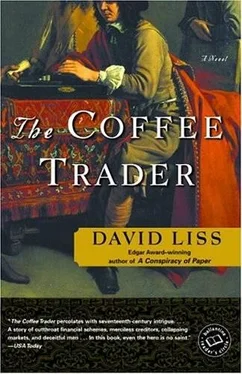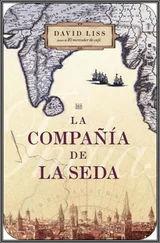“What madness is this?” Miguel demanded. “Of what threat to our Nation do you speak? Your wife and Annetje were accosted by a madman. I fended him off. I hardly understand why that should be fodder for scandal.”
“We both know there is more to it. First I hear you have dealings with the heretic Alferonda. Now I have heard that this man who accosted Hannah was seen speaking to you two weeks ago. I have heard he is a Dutchman with whom you have an irresponsible familiarity. And now he lashes out at my wife and my unborn child.”
“You have heard a great deal,” Miguel answered.
“I might even go so far as to say it hardly matters if it is true-the harm may be the same either way. I have no doubt the Ma’amad would regard these transgressions very seriously.”
“You speak very authoritatively for the Ma’amad and its outdated policies.”
Daniel looked worried, as though they were in public. “Miguel, you go too far.”
“I go too far?” he snapped. “Because I disagree with the Ma’amad in private? I think you have lost your ability to judge the difference between power and wisdom.”
“You mustn’t criticize the council. Without its guidance, this community would be lost.”
“The Ma’amad was instrumental in creating this community, but now it rules without accountability or mercy. It threatens excommunication for the slightest offense, even the act of questioning its wisdom. Shouldn’t we be Jews in freedom rather than in fear?”
Daniel’s eyes widened in the flickering candlelight. “We are foreigners in a land that despises us and needs only an excuse to cast us out. The council stands between us and another exile. Is that what you wish? To bring ruin upon us?”
“This is Amsterdam, Daniel, not Portugal or Spain or Poland. How long must we live here before the Ma’amad understands that the Dutch are not like these others?”
“Do not their clergy condemn us?”
“Their clergy condemn us, but they condemn paved streets, and lighted rooms, and food with flavor, and sleeping while lying down, and anything else that might bring pleasure or comfort or profit. The people mock their preachers.”
“You are naive if you think we cannot be expelled here as we have been elsewhere.”
Miguel sucked his teeth in frustration. “You hide in this neighborhood with your countrymen, knowing nothing of the Dutch, and so you think them evil because you cannot trouble yourself to learn otherwise. This land rebelled against its Catholic conquerors, and then allowed the Catholics to continue to live among them. What other nation has done such a thing? Amsterdam is a stew of foreigners. The people thrive on having aliens around them.”
Daniel shook his head. “I’ll not say you are wrong about these things, but you are not going to change the Ma’amad. It will continue to act as though we are in danger at every moment, and it is better for it to do so than grow complacent. Particularly when Solomon Parido is a parnass, you must treat the Ma’amad’s power with respect.”
“Thank you for your advice,” Miguel said icily.
“I’ve not yet given you advice. My advice is that you do nothing to endanger my family. You are my brother, and I’ll do what I can to shield you from the council, even if I think you’re deserving of its anger, but I’ll not place you before my own wife and unborn son.”
Miguel could say nothing.
“There is more,” Daniel said. He paused to play with a tooth for a moment. “I have not said anything of this to you before,” he mumbled, one finger still in his mouth, “because I knew you to be in a great deal of difficulty, but I have heard that things have changed with you. There is the matter of the money I lent you-some fifteen hundred guilders.”
Miguel nearly gasped. The loan had been like a fart at Shabbat meal: everyone notices, but no one says a word. After all these months, Daniel now finally spoke of the money, and the spell of silence was broken.
“We have all heard about your success in the whale-oil trade-which came, I might add, at the expense of other men. In any case, now that you have some guilders in your account, I thought you might repay me at least a portion of what you owe. I should very much like to see a thousand guilders transferred into my account tomorrow.”
Miguel swallowed hard. “Daniel, you were very good to lend me that money, and of course I will repay it when I can, but I have not yet received the funds due to me from that trade. You know that broker, Ricardo? He won’t pay me or disclose his client.”
“I know Ricardo. I’ve always found him a reasonable man.”
“Then perhaps you might reason with him. If he pays me what he owes, I will be happy to lighten my debt to you.”
“I have heard,” Daniel said, now staring at the floor, “that you have more than two thousand guilders in your Exchange account right now. I must conclude that the rumors you have been spreading about Ricardo are an abuse of a good man’s name meant to help you avoid paying your debts.”
Geertruid’s money. How had he learned of it? “That is not money from Ricardo; it is money from a partner for a business transaction. And accounts at the Exchange Bank are supposed to be private.”
“Little can remain private in Amsterdam, Miguel. You should know that by now.”
Nothing was so infuriating as Daniel playing the great merchant with him. “I cannot give you any of that money; it is not mine to give.”
“Whose is it?”
“That’s a private matter, though I’m sure no such private matters are beyond your reach.”
“Why private? Are you brokering for gentiles again? Do you dare to risk the wrath of the Ma’amad after you have so angered Senhor Parido?”
“I never said I was brokering for gentiles.”
“But you don’t deny it either. I suppose all this is related to your coffee dealings. I told you to stay away from coffee, that it would ruin you, but you would not listen.”
“No one has been ruined. Why do you jump to these absurd conclusions?”
“I’ll have at least part of that money before you lose it,” Daniel assured him. “I must insist that you transfer a thousand guilders to me. If you are unwilling to pay a portion of your debt to me when you have money,” he said, “you insult the charity I have offered you, and your continuing to live here will no longer be acceptable.”
For a fleeting instant, Miguel seriously considered murdering his brother. He imagined himself running Daniel through with a blade, of beating his head in with a candlestick, strangling him with a rag. The outrage of it all. Daniel knew that if Miguel moved out, took his own lodgings, the world would see it as a sign of his solvency, and his creditors would descend and pick away with their ravenous beaks until there was nothing left. There would be demands and challenges and hearings before the Ma’amad. It would be only a matter of days before his dealings with Geertruid were exposed.
“I might consider an alternative, however,” Daniel said after a moment.
“What alternative?”
“I might withhold my demand for the money you have long owed me in exchange for information about your coffee dealings and perhaps the opportunity to invest in your project.”
“Why will you not believe that I have no dealings in coffee?” Miguel demanded.
Daniel stared at him for a moment and then looked away. “I’ve given you your options, Miguel. You may do as you like.”
Daniel had given him no choice: surrender a thousand guilders now or lose everything in a matter of days.
“I’ll transfer the funds to you,” Miguel said, “but you must know that I resent your demands, which harm my business and make it all the more difficult for me to extricate myself from my debts. But I promise you this: I will not allow your pettiness to undermine my affairs. I’ll be out of debt in a matter of months, and it is you who will come begging to me for scraps.”
Читать дальше












